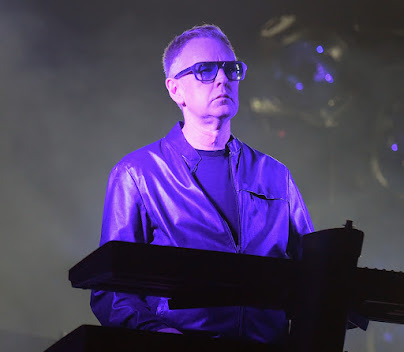Born in Nottingham in 1961, Andy Fletcher grew up in Basildon, Essex. He met Vince Clarke in school in the late 1970s and they formed a band called No Romance in China, where Fletch played bass guitar. In 1980 they formed a new band, Composition of Sound, with their friend Martin Gore. Fletch switched to synth bass. A few months later, they recruited Dave Gahan on vocals and changed the name to Depeche Mode, having seen the name in a French magazine (it means "fast fashion").
Clarke left the band in 1981, having recorded the album Speak & Spell and the hit single "Just Can't Get Enough" with the band. Clarke went on to found Yazoo and Erasure (famously offering the smash hit song "Only You" to the band as a parting gift, which the Mode rejected). Depeche Mode recruited Alan Wilder to replace him and the band went through several years of gradual profile-building, through several albums of gradually increasing sales and relentless touring through first Europe, then Asia and the United States. The band achieved a major breakthrough with the 1986 album Black Celebration and then its 1987 follow-up, Music for the Masses, which delivered them huge success in America (as seen on the massive "101" tour and its culminating gig at the Rose Bowl, Pasadena, filmed for the documentary 101).
After a hiatus, the band returned in 1990 with the giga-selling album Violator and its hit anthems "Personal Jesus" and "Enjoy the Silence." The band started spiralling out of control during the recording of the follow-up, Songs of Faith and Devotion (1993), with Gore, Fletch and Gahan all experiencing problems with depression and/or substance abuse. Alan Wilder, after weeks of being the only person to show up at sound checks and mixes, finally quit the band in frustration. The band almost split up after the following tour (sometimes described as one of the most hedonistic in music history), especially after Gahan suffered multiple drug overdoses that left him technically dead for several minutes. However, cleaning up their act, the band regrouped to deliver the albums Ultra (1997), Exciter (2001) and career-renaissance record Playing the Angel (2005). They have since released Sounds of the Universe (2009), Delta Machine (2013) and Spirit (2017), to varying degrees of critical acclaim.
Depeche Mode have sold over 100 million records and, despite a low-key response to new music since Playing the Angel, they remain an absolutely massive international draw, selling out stadiums all over the world and enjoying success in countries a lot of artists never bother travelling to. The band have never quite enjoyed the success at home that they have abroad, however: they have never had a British #1 single and British music periodicals and websites tend to overlook their contributions in assessments of major musical acts of the 1980s and 1990s. In contrast, in the United States and Europe, they are often cited as the most influential and important British band since The Beatles, and more important than any of their synth peers from the same time period. This remains fiercely debated.
Andy Fletcher's role in the band has been somewhat underrated. In the early days he played a key musical role on synthesiser, particularly bass synths, and contributed musically to the band. However, when Martin Gore took over as primary songwriter and composer, he exerted much more control over the band's musical direction. Alan Wilder was able to push back against this to exert some influence over their material (famously upgrading "Enjoy the Silence" from a ballad to the faster-paced synth-rock classic it became, and feeling he didn't get enough credit for that). Fletch, by contrast, seemed happier to sit back out of the firing line and deliver what the other bandmembers wanted musically.
However, Fletch switched to taking over many of the band's management roles, including their business affairs and organising tours. He also stepped into the role of peacemaker in the band, mediating between the strong personalities of Gahan, Gore and Wilder. It's notable that Depeche Mode's rockiest period came when Fletch suffered depression following a series of business venture failures, resulting in him being absent from the band when it almost self-destructed. In the post-Wilder era, he returned to his role as the band's heart, and in particular was instrumental in managing the egos in the band when Gahan decided to become a full songwriter and stepped up his musical contributions, something Gore sometimes felt hard to handle. Music journalists often mocked Fletch's role as "showing up to cash the cheques," especially when they spotted touring musicians performing the synth parts Fletch used to, something Fletch comfortably joined in with due to his own self-deprecating humour. In 1989 he said, "Martin's the songwriter, Alan's the good musician, Dave's the vocalist, and I bum around."
Outside of the band, Fletch spent some time managing the band CLIEИT and has extensively worked as a DJ, particularly in Europe and South America.
Andy "Fletch" Fletcher is survived by his wife Grainne and children Megan and Joe. As arguably the heart and soul of one of the greatest electronic bands in history, he will very much be missed.

Saw them live in Boston a few years back and they were great. A very sad loss.
ReplyDelete